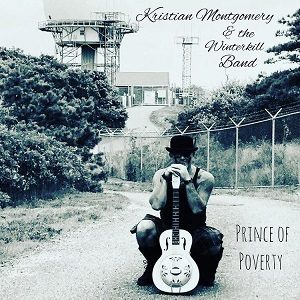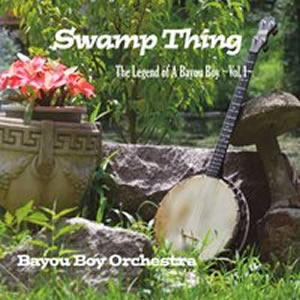Kristian Montgomery has been on the Boston music scene for many years, albeit not consecutive years. He has worked in construction and as a commercial fisherman. He was also briefly an inmate at Plymouth County Jail. Montgomery was recently nominated for Country Artist Of The Year by the Boston Music Awards for his accomplishments as Kristian Montgomery And The Winterkill Band. Many say this underdog for the award has got a lot of momentum. The hard driving singer-songwriter is somewhat mystified by his nomination.
“Weird,” he said. “It’s kind of a full circle kind of feeling.”
Montgomery was nominated for a BMA during a previous stint as a heavy metal front man some years ago. “I left the year I was nominated for a Boston Music Award prior to this one. It’s like picking up where I left off, almost.”
This all seems like a dream come true for a man who once spent time behind bars. Montgomery’s story is a familiar one to many who have dealt with the divorce courts. Blowing off steam on Facebook was misinterpreted as witness intimidation, which landed him in jail for six months, following a plea deal that saved him from a ten years sentence.
“I’m a type one diabetic,” Montgomery began. “I stood in front of a judge and I asked him to reduce my child support so I could afford my insulin and continue to work and support my family. He denied it. I did what any father was supposed to do. I paid my child support and couldn’t afford my insulin. Eventually, my heart stopped. I had to be resuscitated at Beth Israel Deaconess Hospital in Plymouth Mass. While I was in the hospital, I found the judge on Facebook, and I sent him a letter begging for my life, at which point he had me arrested.”
Here is where Montgomery’s story becomes complicated and sad: ‘There were no threats involved. The only thing I said that could in any way construed as a threat was ‘I guess I’m just another martyr’, meaning if I can’t afford my insulin, I’m going to be another member of the fathers’ rights movement to pass away from court related issues. They arrested me and threw me in jail. They came to me every couple of weeks basically saying ‘Are you ready to apologize?’ and I would say I didn’t do anything wrong.”
According to Montgomery, the judged said the letter was a form of “witness intimidation” because the judge was a witness to his case.
“He knew exactly what I meant. He knew I was talking about my insulin. But, I had been critical of him publicly in the press. So, he used this opportunity, while I was out of my mind recovering from nearly dying, to have me thrown in prison.”
Montgomery never went to trial. He took a plea just to get the whole matter concluded. Montgomery’s plea was heard in district court, the lowest level court, in front of a judge.
“They told me that if I didn’t take a plea, I would be tried in superior court,” the country singer-songwriter said. “They would indict me in superior court where it was a ten year prison sentence for this. So, I got scared and I said ‘OK, I’ll take the plea.’” Montgomery received six months in Plymouth Country Jail. His biggest regret was how it would all affect his children.
“Divorce is a really big business in the United States. The family court system is a mess in the United States,” he said. “It screwed me up when I was a kid when my parents got divorced and it screwed my kid up now that I’m divorced.”
After being released from Plymouth country, Montgomery took some songs he had written during his incarceration to producer Joe Clapp at Clapp’s Ultrasound Productions studio. Mr Clapp helped Montgomery birth the songs. When Montgomery first picked up his guitar, the songs flowed right out of him, sounding exactly how he wanted them to sound. Another six month went by and Montgomery had his first KMWKB album ready for release.
Montgomery’s motivation, to pick himself up and return to music, was his children. They had been reaching out to him the entire time through social media. He was not allowed to respond to them. He wanted to show his kids that even during the darkest times there is still light. So, he kept writing and recording and putting his music out there. Kristian Montgomery And The Winter Kill Band released those songs in the full length album The Gravel Church. The album title refers to a 25 by 25 foot walking area where Montgomery was allowed to walk around in during his incarceration when as an inmate he needed fresh air.
 “I wrote a song called Razor Wire Heart about my experience in prison,” he said. “The last line is ‘I hope some day you’ll find me/And we can put all this behind me/Because I have a heart like razor wire.’ That was one of the lines that came to me in jail. It’s a song for my kids. I found my father when I was 25. I got to hear the stories about the battles in family court and just how corrupt the system is.”
“I wrote a song called Razor Wire Heart about my experience in prison,” he said. “The last line is ‘I hope some day you’ll find me/And we can put all this behind me/Because I have a heart like razor wire.’ That was one of the lines that came to me in jail. It’s a song for my kids. I found my father when I was 25. I got to hear the stories about the battles in family court and just how corrupt the system is.”
Montgomery’s music genre, in this phase of his career, came out of his creativity and experience as hard driving country music. That is a far cry from the metal music he composed for his old band Bone Dry System or the grunge sound he adopted on a 2003 solo album.
“I haven’t since written a song with the intent to write it a certain way. It just happens,” he said. “I was born in Florida. I’m a southern boy. I have a great appreciation for country and southern rock. My first concert was Larry Gatlin And The Gatlin Brothers. My second concert was Ozzy Osbourne. I have an appreciation for all kinds of music. Tom Petty was pretty good at defining his own sound. It wasn’t country. It wasn’t rock. It was just Tom Petty. I think that’s what I’m trying to accomplish is for people to say ‘That’s Kristian Montgomery.’”
Montgomery said many of his song ideas just pop into his head, and he’s not sure why. Spontaneously, it’s a thought, a conversation, or a fleeting glimpse of another person or a feeling. “And all of a sudden, a song gets built around it,” he said. Once Montgomery has the bare bones of a song written down, he brings it to his mentor Clapp.
 “It is absolutely amazing. Joe is one of the most talented people I have ever met in my life,” Montgomery said. “It’s a shame he wasn’t nominated for best producer at Boston Music Awards. The guy is just a master of his trade. When he comes to guitar and recording, he just inspires you. He’s such a positive person. When I was recording The Gravel Church, he would sigh and say ‘Man, I’m sorry you had to go through all this.’ Then, he’d smile and go ‘but these songs are amazing.’”
“It is absolutely amazing. Joe is one of the most talented people I have ever met in my life,” Montgomery said. “It’s a shame he wasn’t nominated for best producer at Boston Music Awards. The guy is just a master of his trade. When he comes to guitar and recording, he just inspires you. He’s such a positive person. When I was recording The Gravel Church, he would sigh and say ‘Man, I’m sorry you had to go through all this.’ Then, he’d smile and go ‘but these songs are amazing.’”
Montgomery is particularly impressed with how Clapp would make guitar parts come alive in the studio. Montgomery plays solid rhythm guitar on his albums while Clapp developed the lead guitar phrases.
“He took these songs that were just basic little country tunes and turned them into rock opera material.” Montgomery’s Winter Kill band also featured Jeff Armstrong from Delta Generators on drums and Dave Leach who worked with KC from Shake The Faith.
“Joe plays guitar, piano, banjo, pretty much any instrument other than drums and bass, Joe’s on it, even the Northumbrian pipes on The Gravel Church. That was all Joe.”
The Northumbrian pipes were used on a Montgomery cover of “Auld Lang Syne.” That cover was inspired by the fact Montgomery’s mother’s family were from Scotland and his father is from Copenhagen.
“We were (recording) less than a mile away from where our great great grand parents are buried. They came over from Wigtownshire,
Scotland. It was an emotional moment where we just spontaneously said ‘Hey, lets do a cover of this.’ It just came out dark and deary and it was awesome.”
Whereas The Gravel Church was about Montgomery’s six month jail sentence. His follow up album Prince Of Poverty was about his low income childhood. His father, an immigrant from Copenhagen, worked as a commercial fisherman after being hurt in Vietnam and who later passed away at age 54. Montgomery grew up having just enough of what he needed provided to him by his parents. Thanks in part to a large family garden, they had the basics. The rest of the area where Montgomery and his family resided was wealthy and being developed.
“I grew up playing in bands with a lot of kids who would show up with a brand new Les Paul,” Montgomery said. “I’d be like ‘Where’d you get that?’ He’d be like ‘My parents got me this for my birthday.’ I’d be like ‘Christ, I’d be lucky if I got a pair of socks for my birthday.’ I grew up with a little bit of a chip on my shoulder. To be honest, it sticks to this day. Boston, I’ve always thought, has two different scenes. It’s got a working class scene, and it’s got more of the upper class scene.”
Montgomery still suffers the curse of those fated to be born with less. A commercial fisherman, like most tradesmen, he gets the hell beaten out of his body. His music was also what he needed to keep his mind off his troubles.
“The only way I could do it with my kind of A.D.H.D. was just stay occupied,” he said. “I was writing music and worry about not drowning at sea. Those were my two priorities.”
 Montgomery’s upcoming album, A Heaven For Heretics, is already in the can, waiting for release parties that he’s trying to organize at the Spire Center in Plymouth and the Hard Rock Cafe in Boston. This time around, Montgomery’s singer-songwriter sympathies lie with those who felt they lived on the periphery of the music scene, who are not in the “cool kid” crowd, those who always felt a little different or maybe not able to understand other people well.
Montgomery’s upcoming album, A Heaven For Heretics, is already in the can, waiting for release parties that he’s trying to organize at the Spire Center in Plymouth and the Hard Rock Cafe in Boston. This time around, Montgomery’s singer-songwriter sympathies lie with those who felt they lived on the periphery of the music scene, who are not in the “cool kid” crowd, those who always felt a little different or maybe not able to understand other people well.
“My daughter got married to a woman,” Montgomery said. “Her wife is absolutely fantastic, and I love her to death. With this album, there is a lot of reflection on ‘Why was this ever taboo?’ Why was this ever weird?’ Why would anybody ever think it was wrong for this to happen? People died because of it. This album is all about change.”
Montgomery hopes to hold his CD Release parties in January. He’s put together a new band to start touring on A Heaven For Heretics. Montgomery would also like to work with other artists named in the same BMA country music category with him.
“With Type 1 Diabetes and working in construction, it’s not congruent with long life,” Montgomery said. “I’m one of the few people who, if I could, find some label support, find some avenue to get on the road and play, it would help me live longer. I’d love to finish this second half of my career on the road.”





